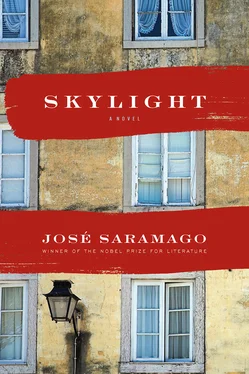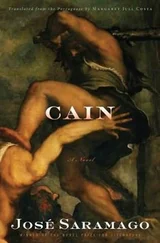When Rosália opened the door, she was shocked to see the distraught expression on her husband’s face.
“Whatever’s wrong, Anselmo?”
He went straight into the kitchen without saying a word and slumped down on a bench. Rosália thought that the worst must have happened:
“Oh, no, they haven’t given you the sack, have they?”
Anselmo was still too distressed to speak. He shook his head. Then, in a hollow voice, he said:
“Your daughter has been deceiving us! I followed her. She only stayed with the teacher for about a quarter of an hour and then off she went with some good-for-nothing who was waiting for her outside!”
“And what did you do?”
“I didn’t do anything. I followed them. Then I came home. She should be here at any moment.”
Furious, Rosália blushed to the roots of her hair:
“Well, if I’d been you, I’d have gone over to them… and sorted them out good and proper!”
“Think of the scandal, though!”
“What do I care about scandal! I’d have given him a couple of slaps around the face that would have knocked him sideways, and as for her, I’d have dragged her home by the ear!”
Anselmo said nothing, but got up and went to change his clothes. His wife followed him:
“So what are you going to say to her when she arrives?”
There was a hint of insolence in her voice, or so it seemed to Anselmo, who was used to being lord and master of the household. He shot his wife a piercing glance, then, holding her gaze for a few seconds, said:
“That’s entirely up to me. And by the way, I am not accustomed to being spoken to in that tone, here or anywhere else!”
Rosália bowed her head:
“But I didn’t say anything…”
“Well, I didn’t like the way you said it.”
Relegated to her role as the weaker vessel, Rosália returned to the kitchen from which there came a faint smell of burning. As she struggled to save the supper, the doorbell rang. Anselmo went to open it.
“Evening, Papa,” said Claudinha cheerily.
Anselmo did not answer. He let his daughter in and closed the front door. Only then did he speak, ushering her into the dining room:
“In you go.”
Surprised, she obeyed. Her father told her to sit down and then, standing before her, fixed her with a fierce, stern gaze.
“What did you do today?”
Maria Cláudia tried to smile and act naturally:
“The usual. Why do you ask?”
“That’s my business. Answer me.”
“Well, I went to the office. I left just after half past six and…”
“And…”
“Then I went to my shorthand lesson, and because I’d arrived late, I left later than usual as well…”
“What time did you leave?”
Clearly embarrassed, Claudinha took a while to respond, then:
“Just after eight…”
“That is false!”
She shrank back. Anselmo savored the effect of his words. He could have said “That’s a lie,” but had opted for “That is false” as being more dramatic.
“Oh, Papa…,” she stammered.
“I very much regret this present situation,” said Anselmo, his voice shaking. “It’s unworthy of you. I saw everything. I followed you. I saw you walking along with that… that ne’er-do-well.”
“He’s not a ne’er-do-well,” retorted Claudinha resolutely.
“What does he do, then?”
“He’s a student.”
Anselmo snapped his fingers, intending to express the insignificance of such an occupation. And as if that were not enough, he cried sarcastically:
“Oh, wonderful, a student! ”
“But he’s a really nice boy!”
“Why, then, has he not been to see me?”
“I told him not to come. I know how fussy you are…”
Someone knocked lightly on the door.
“Who is it?” asked Anselmo.
This was rather a pointless question given that there was only one other person in the apartment. The answer was equally pointless, but was given nonetheless:
“It’s me. Can I come in?”
Anselmo did not bother to give his consent, because while he would have preferred not to be interrupted, he was aware that he could hardly deny his wife access. He chose instead to say nothing, and Rosália joined them:
“So, have you told her off?”
If Anselmo had been in the mood to tell his daughter off, that mood had passed. For some reason even he could not understand, his wife’s intervention made him feel that he should take his daughter’s side.
“Yes, we’ve finished now.”
Rosália put her hands on her hips and angrily shook her head, saying:
“I can’t believe it, Claudinha! How could you? Just when we were feeling so pleased about your new job, you go and do this to us!”
Maria Cláudia sprang to her feet:
“But, Mama, how am I ever going to get married if I don’t have a boyfriend?”
Father and mother were dumbstruck. The question was perfectly logical, but hard to answer. Anselmo thought he had found the right riposte:
“But a student… I mean, what does a student amount to?”
“He might not amount to much now, but he’s studying so that he can become someone!”
Claudinha was regaining her composure. She could see that her parents were wrong and that reason was on her side. She went on:
“Don’t you want me to marry? Tell me!”
“It’s not that we don’t want you to marry, child,” said Anselmo. “But we want you to marry well. A girl with your qualities deserves a good husband.”
“But you don’t even know him!”
“No, I don’t, but it doesn’t matter. Besides…” And here his voice grew stern again: “Look, I don’t have to explain myself to you. I forbid you to meet that… that student ever again. And so that you don’t go trying to pull the wool over my eyes, from now on I’m going to take you to your lesson and bring you back. It means more work for me, but if that’s how it has to be…”
“But, Papa, I promise…”
“I don’t believe you.”
Maria Cláudia stiffened as if she had been struck. She had frequently lied to her parents, scornfully toyed with them as often as she liked, but now she felt they were treating her unfairly. She was furious. Taking off her coat, she said:
“Do as you please, but I warn you, you’ll have to hang around outside the office. Senhor Morais always has jobs to do that require me to stay late.”
“That’s all right. I don’t mind.”
Claudinha opened her mouth to speak. From the look on her face, it seemed as if she were about to answer back, but she changed her mind and said nothing, a vague smile playing on her lips.
Ever since he had begun to live freely and independently, Abel had sometimes asked himself: “Why?” The answer was always the same comfortable negative: “No reason.” But when his thoughts repeated the question, he would say: “No, there is a reason. Otherwise, there would be no point,” adding: “I’m just going to let life happen. It’s sure to lead somewhere.”
He could see perfectly well that “it,” his life, was leading nowhere, that he was behaving like a miser who hoards gold simply for the pleasure of looking at it, except that in his case it wasn’t gold but experience, which was the one thing he took from life. And yet experience, unless applied to something, is just like that hoard of gold, for it neither produces nor bears fruit and is utterly useless. There is no point in a man accumulating experience the way someone else might collect stamps.
Abel’s sparse and ill-assimilated readings in philosophy, gleaned at random from schoolbooks or pamphlets unearthed from amid the dust in the secondhand bookshops on the Calçada do Combro, allowed him to think and to say that he was searching for the hidden meaning of life. But when he was in one of his disenchanted moods, he had to admit that this was a purely utopian desire and that however much experience he accumulated, the veil he was trying to draw aside would only grow thicker. The lack of any real meaning to his life, however, forced him to stand by that desire — which had long since ceased to be one — and to make of it as good or as bad a reason to live as any other. On those grim days when he felt surrounded by the vacuum of absurdity, he always felt particularly weary. He tried to blame his weariness on the daily struggle to earn a living, on the depression brought on by those difficult times when he could barely get by. These were doubtless contributing factors, because hunger and cold do make one weary, but they weren’t enough. He had grown inured to everything, and things that had once frightened him he now viewed with indifference. He had hardened body and mind against difficulties and privations. He knew that he could, with relative ease, step free of them. He had learned to do so many jobs in his time that it would have been fairly easy for him to find a permanent position that would give him enough to live on. He had never taken that step, though. He didn’t want to be caught, he said, and it was true, but the reason why he didn’t want to be caught was that he would then have to admit the pointlessness of his existence so far. What had he gained in taking that long, circuitous route only to end up on the same road being followed by all the people he had tried so resolutely to leave behind? “Do they want me married, futile and taxable?” Fernando Pessoa had asked. “Is that what life wants of everyone?” asked Abel.
Читать дальше












